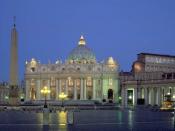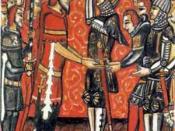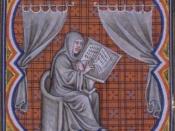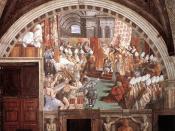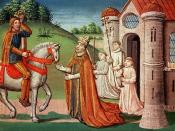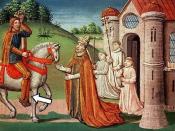The aristocracy of the medieval ages formed a symbiotic relationship with the peasants, a situation in which both parties contribute, although the peasant's contribution seems to be more strenuous. By analyzing primary sources, I intend delineate the function of the aristocracy in regards to the peasants, the attitudes and beliefs characterized by aristocrats, and the restrictions placed on them by their responsibilities to the peasants, as well as the church.
Einhard's work, The Life Of Charlemagne, offers some excellent information about the restrictions placed on aristocracy. The document mentions several times Charlemagne's devoutness to the Christian faith and towards the papacy in particular.
Beyond all other sacred and venerable places he loved the church of the holy Apostle Peter of Rome, and he poured into its treasury great wealth in silver and gold and precious stones. He sent innumerable gifts to the Pope; and during the whole course of his reign he strove with all his might (and, indeed, no object was nearer to his heart than this) to restore to the city of Rome her ancient authority, and not merely to defend the church of Saint Peter but to decorate and enrich it out of his resources above all other churches (Einhard, qtd.
in Kishlansky: 129.) This quote illustrates the aristocracy's responsibility to the Christianity and the Papacy. Charlemagne is loyal to Roman Catholic Church, as opposed to the simply the Christian faith. The distinction is clearly made by the way in which Einhard refers to the church as the "the church of the holy Apostle Peter of Rome". This title clearly distinguishes it from the general Christian faith. It also implies a strong connection between Charlemagne as an aristocrat of high authority to the Church in Rome. The nature of this connection is made clearer within the quote.
Einhard describes Charlemagne's devotion to "the church of the holy Apostle Peter of Rome", citing the wealth Charlemagne donates to the Church. According to Einhard, Charlemagne "poured into its (the Church's) treasury great wealth in silver and gold" and "he sent innumerable gifts to the Pope". The fact that Charlemagne gave so much to the Church, and to the Pope, implies possible responsibilities required of aristocrats. Either Charlemagne was simply very devout, or the Church expected such gifts from the aristocrats in order to maintain the favor of the Church. Later in the quote, Einhard says that Charlemagne tried "to restore to the city of Rome her ancient authority". The word ancient is important here because it implies that while the Church isn't as powerful as it once was, it still maintains a certain authority. This, coupled with Einhard's record of the incredible amount of gifts given to the Church implies a great deal. It implies that the "gifts" may have been more of a sort of tribute, an obligation required of the aristocracy by the Papacy. However, the aristocracy wasn't obligated to the Church alone.
The aristocracy was obligated to the peasants as well as the Church. In the section of Kishlansky entitled "Feudal Documents", the responsibilities of the aristocracy to the peasant class are clearly defined. The responsibility of the peasant to the aristocrat are encompassed in six things that the peasant must keep in mind, "what is harmless, safe, honorable, useful, easy, practicable (Bishop of Chartres, qtd. in Kishlansky: 154.)" Chartres goes on to explain these rules in further detail.
Harmless, that is to say that he should not be injurious to his lord in his body; safe, that he should not be injurious to him in his secrets or in the defenses through which he is able to be secure; honorable, that he should not be injurious to him in his justice or in other matters that pertain to his honor; useful, that he should not be injurious to him in his possessions; easy or practicable, that that good which his lord is able to do easily, he make not difficult, nor that which is practicable he make impossible to him (Bishop of Chartres, qtd. in Kishlansky: 154.) The Bishop of Chartres says that these rules apply to the lords, or aristocrats as well (Kishlansky 155). However, when the supposedly universal rules are looked at closely, they are decidedly in the aristocrats favor. Chartres says that a vassal should be "harmless" to his lord, meaning that he shouldn't kill or other wise physically hurt his lord. This rule seems to serve a basically just purpose, preventing murder and lesser physical attacks, but it also implies the responsibility of the lord to protect his vassal from large outside attacks, such as invasions. The fourth rule is that both lord and vassal be "useful". By this he means, for the lord, that he should not impede the vassal in regards to possessions. This rule prevents the lord from taking unfairly from the property of the present. The last rule is that the lord and vassal should be "practicable" to each other. This rule essentially provides that the lord not impede the vassal in his pursuit of happiness. On the surface, these rules seem fairly just. However, the rules offer no means by which a peasant can claim wrongdoing against the lord. Also, there is no proposed punishment for violation of these rules. The peasants don't seem to have a means to seek justice against their vassals in any case.
While the six rules offered by Chartres are too idealistic to be functioning laws and suggest a high degree of injustice in regards to the relationship of lord to vassal, Einhard offers a more benevolent view of the aristocracy in his work, The Life of Charlemagne. Einhard describes one of Charlemagne's contributions to his people, namely the adjustment and refinement of their laws.
When he had taken the imperial title he noticed many defects in the legal systems of his people; for the Franks have two legal systems, differing in many points very widely from one another, and he, therefore, determined to add what was lacking, to reconcile the differences, and to amend anything that was wrong or wrongly expressed. He completed nothing of all his designs beyond adding a few capitularies, and those unfinished (Einhard, qtd. in Kishlansky: 129.) This quote is important because it not only shows a sort of benevolent responsibility that Charlemagne had toward the peasants. Einhard says "he noticed many defects in the legal systems" and that Charlemagne "determined to add what was lacking and to amend anything that was wrong." This implies a concern for his people. Charlemagne saw a legal problem, a problem that he felt somewhat obligated, as king, to fix. This shows at least some degree of responsibility towards the well being of his people. The last part of the quote is revealing about how the aristocracy saw itself.
Einhard makes an important observation about the well-intentioned plans of Charlemagne to reform the laws of his land, the fact that he never finished. Einhard says that Charlemagne "completed nothing of his designs beyond adding a few capitularies" and that even these were left "unfinished." The fact Charlemagne never finished his great social work implies possibly that it wasn't really that important to him.
While Charlemagne tried to contribute to the betterment of his people, it didn't seem to really be that important to him, perhaps because of his high station as an aristocrat. The Song of Roland offers evidence that the aristocrats were seen as having a closer relationship with God, and other divine entities, such as angels. After the death of Roland, God takes it upon himself to assist Charlemagne.
The king, on seeing dusk begin to fall, dismounts upon the green grass in a field, prostrates himself, and prays Almighty God that he will make the sun stand still for him, hold back the night, and let the day go on. An angel he spoken with before came instantly and gave him this command: "Ride on Charles, for the light shall not desert you. God knows that you have lost the flower of France; you may take vengeance on the guilty race." (Traditional, qtd. in Kishlansky: 166.) Charlemagne wants to pursue his enemies but dusk is upon him. So he simply asks God to postpone nightfall and it's done. An angel even comes to tell Charlemagne that God is on his side and wants him to defeat his enemies. This quote is important because it helps establish the aristocrats' view of themselves. Essentially, by being able to contact God and receive his help so easily, it is implied that Charlemagne has closet ties to God, closer than a commoner. This implies that aristocrats saw themselves as higher up than the peasants. They saw themselves as more akin to God. The relationship between the aristocracy and God seems to mirror the relationship between the peasants and the aristocracy.
The aristocracy saw themselves as closer to God, thereby being better than the peasants and perhaps the peasants saw them in this way too. This mentality help facilitate a society in which only the chosen few, those more closely related to God could rule and protect those who were less good, namely the peasants. In this society, the aristocrats served as leaders, responsible for the well being of their vassals, while the vassals served as grunts, being unfit to lead due to their apparent lack of divinity.
